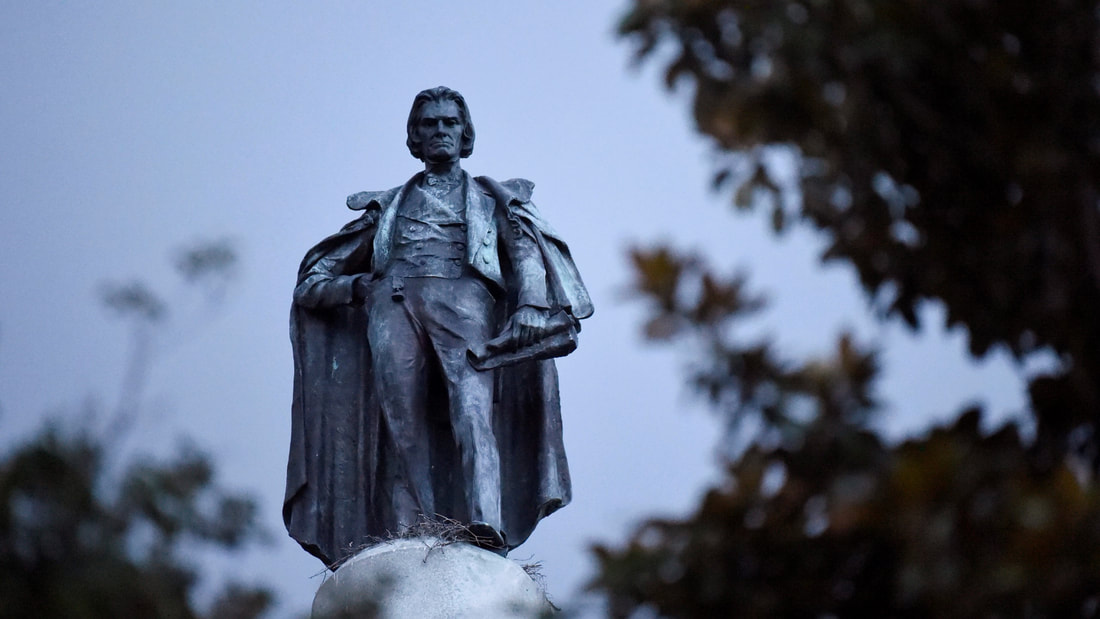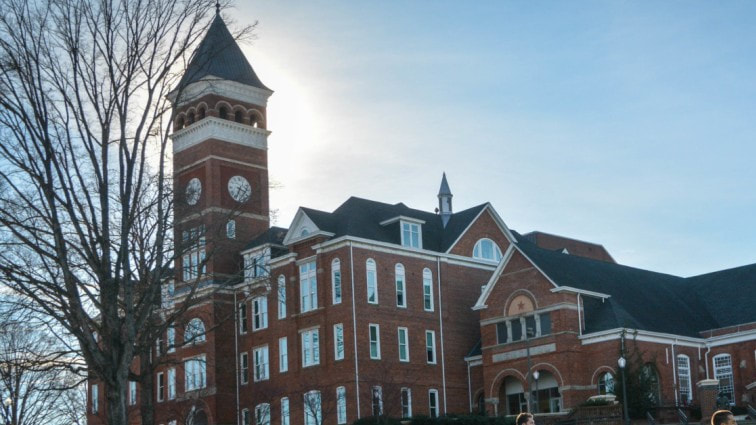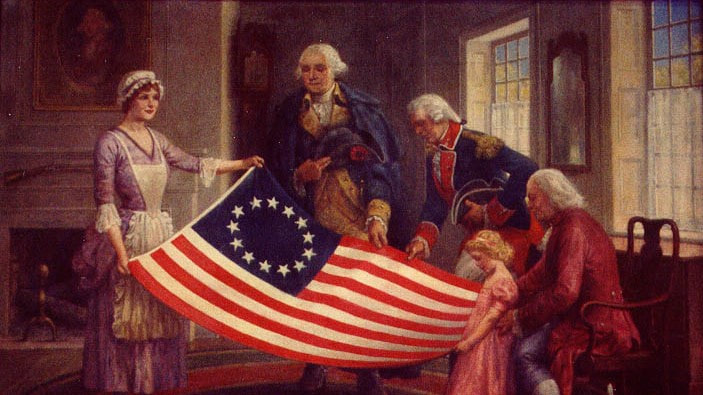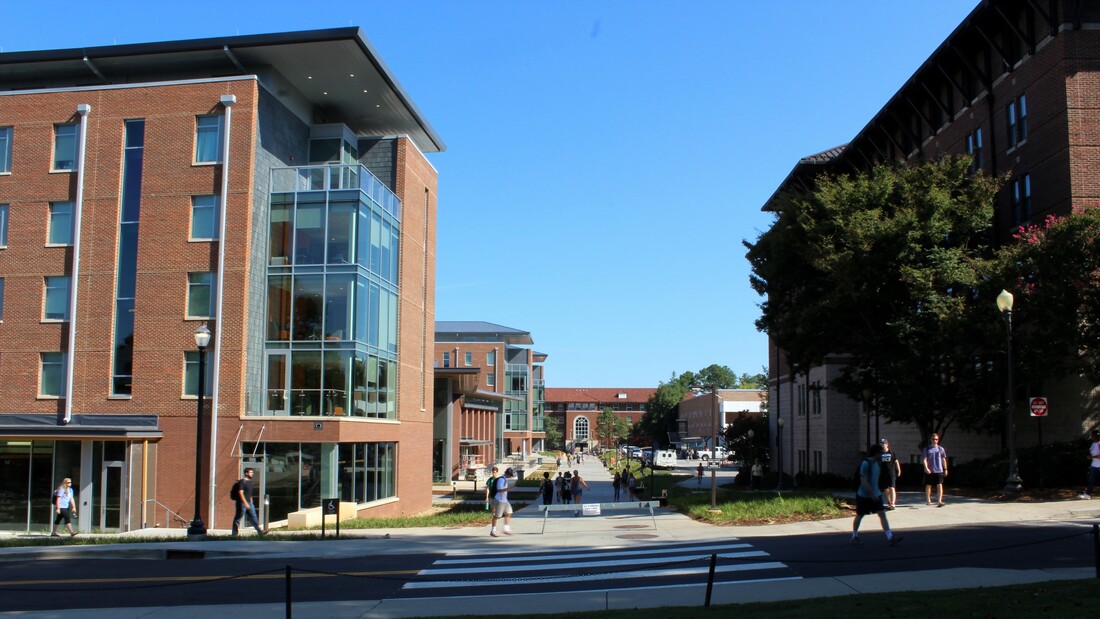|
Perhaps no American thinker has suffered more in recent days than John C. Calhoun, whose work and personage are often dismissed by his critics for a single phrase attributed to him, diminishing the careful and complicated analysis he deserves. Critics of Calhoun simplistically suggest his statecraft and thought, as well as his critique of America, serve a single purpose: the protection of his native South, especially the institution of slavery. In our current climate, when all things Southern can be attacked and dismissed regardless of the accuracy of the criticisms, comes Professor Christian Anderson, a professor of education (not an historian or social scientist) at the University of South Carolina, who offers a strangely misguided and inaccurate diatribe against the Great Carolinian. In his manifesto against all things Calhounian entitled “Dismantling John C. Calhoun’s Racist Legacy,” Anderson essentially credits Calhoun as the source of all the ills of modern America.[1] He is very proud of his article, having submitted and published the article in three different leftist (and “in house”) publications. While Calhoun offered a moderate defense of slavery, viewing the slavery situation as part of a larger discussion of the evolving nature of Southern society, it was neither the most important nor most consuming aspect of his political thought. In most of the great debates of his lifetime, including a myriad of concerns from nullification to slavery, Calhoun should be understood as a source of moderation amid seas of extremism. Because of Calhoun’s own complex views and long-standing regional tensions, some of his critics attempt to use slavery as a means of distracting students of Calhoun’s political thought from a more complete examination of his work and its continuing importance to American politics. Defending slavery was not the touchstone of Calhoun’s political thought, but it is also accurate to acknowledge his support of the institution. Calhoun believed that the slavery problem would resolve itself over time, but the need to preserve the Republic and to improve the citizenry’s understanding of the regime’s foundational elements were of greater importance. Calhoun’s best known depiction of slavery as a “positive good” has provided his critics with a sustained basis for the criticism of his statesmanship and political thought. The comment, and the context of the speech in which the term was used, and the national debate that occasioned the speech, have never received the scholarly attention and analysis that are needed to comprehend what Calhoun was actually attempting to delineate. For the sake of advancing our understanding, the existing institution of domestic slavery was regularly described in a related manner by numerous Antebellum writers. And contrary to popular academic understandings, many colonial and Founding era writers and politicians pioneered the position. In other words, the formulation was neither Calhoun’s creation nor novel in any regard, and he was not declaring that slavery in the abstract was a “positive good” in the social and political environment at the time of his writing. Another incorrect assumption, among a litany of errors, made by Professor Anderson is that the term was a permanent depiction or formula for slavery in American life. In reality, Calhoun is responding to a particular sect of Abolitionists who possess, he argues, “a systematic design of rendering us hateful in the eyes of the world, with a view to a general crusade against us and our institutions.” In demonstrating the radical nature of the assault on the South and Southern institutions, Calhoun exposed the central tenets of a new Abolitionist movement that had emerged as well as the potential destabilizing influence of such movements on the political order. In other words, as the eminent historian Clyde Wilson observes, Calhoun’s “Remarks” speech was “not launching some great innovation in the Southern attitude toward slavery because most of what he had to say was already a well-developed part of American discourse.” Ill-timed and ill-chosen, the words gave copious amounts of political ammunition to his enemies ever since. Nonetheless, the statement for Calhoun and his Senate supporters was a statement of fact concerning the relative position of Southern slavery in a global perspective. It was not a political doctrine but an effort to separate the actual function of slavery from the symbolic litmus test issue it had become in Antebellum politics. While seemingly unsuccessful, Calhoun reflected a broader desire across the South and other regions of the United States to de-politicize serious social issues in the wake of what they perceived to be rising radicalism of American politics. It was not merely slavery as an institution that they wished to devolve and “spread out.” Other divisive issues like internal improvements, banking reform, taxation, even national military service might cease corroding national politics and fueling partisan anger if relegated to states, regions, and localities. Calling slavery a “positive good” was part of a strategy to remove it from national politics, where—Calhoun often argued—no genuine political solution could emerge. Why? Because for Calhoun the breadth and scope of Antebellum politics had long since become too diverse for genuine political consensus. Not every issue was like this. Some things could be solved through national politics because consensus or near-consensus could be reached. Other things, like taxation of international trade, had to be solved through federal action. But the vast array of political issues affecting Congress went beyond the pale of lasting agreement and thus should be relegated to the states, where consensus might still be reached. For Calhoun, the need to “de-politicize” was intricately joined with the need to “de-nationalize.” This is why Calhoun’s approach to those issues that troubled him most reflected complicated variations of the same strategy. Whether it was monetary reform, internal improvements, or filling the officer ranks of the United States military, Calhoun’s strategy was to remove these matters from the ill-suited realm of national political solutions. For without the possibility of genuine consensus on these matters, there was only room for hyper-sensitivity, bad feelings, partisan pandering, and occasional, self-righteous rage. While Professor Anderson’s ideological rigidity does allow for the search for truth, other Americans will be more discerning about the legacy of Calhoun. This piece was co-authored by Carey Roberts, Ph.D. is Online Dean of the College of Arts and Sciences and Professor of History at Liberty University.
0 Comments
Amidst the multifaceted and current aftershocks resulting from the national turmoil and tensions our country is experiencing, two NFL stars and Clemson alumni, DeAndre Hopkins and Deshaun Watson, have actively joined an effort to remove the name of American statesman and vice-president, John C. Calhoun, from the school’s honor college. The attempt to rename the honors college at Clemson University may win the day. In the last few days and weeks, many historical markers, statues, and related sites have been renamed or removed. It appears that no historical period, person, or movement is exempt from our current hyper-partisanship and lack of historical discernment. Of course, colleges and universities have the option to name or rename structures on their campuses. This happens all the time, and sadly is often driven simply by fund raising efforts. But Hopkin’s and Watson’s attempt constitutes nothing less than the tendency of contemporary Americans to demonstrate how we “forget who we are” and engage in what has become known as political correctness. The advocates of political correctness (an overused term, unfortunately) want to employ history for temporary political gains more than they desire to keep or understand it, and we fear their efforts unintentionally tend to further divide rather than unite the body politic. Perhaps worth considering is the Yale model: buildings are not renamed unless the original name is at odds with the mission of the institution, or if the overall “legacy” of the namesake is seriously deficient in some regard. At the end of the day, Calhoun should have passed this test. Clemson may now join the many operatives of political correctness who have met with great success of late. With Orwellian irony, in the past they succeeded in having a U.S. Navy ship named for a person who hated the Navy (Cesar Chavez) and have imposed “speech codes” (with the actual purpose of restricting speech) on many college campuses–as well as more destructive examples of assaulting First Amendment rights and redefining history. Even former President Obama was not above the fray as demonstrated by his renaming of Mt. McKinley. And, of course, President Trump is famous for renaming things after himself. The greatest threat to political correctness is an environment in which free and uninhibited discussion and disagreement can take place. In fact, diversity of thought is the opposite of political correctness, and is at the heart of a free society. The proponents of political correctness–and those who have succeeded in renaming and destroying so much–stand on the side of censorship against free and open discussion. And, in case we have not noticed, they are winning the day. Calhoun’s “legacy” is indeed complex and subject to debate. However, in denying Calhoun’s vital role in American political life, they have committed a great injustice to the rising generation of Americans. The untold story, now diminished even more by the Hopkins and Watson, is Calhoun’s importance to American political thought and history. While spending most of his public life in the United States Senate, he was also vice president under both John Quincy Adams and Andrew Jackson–and he served as secretary of state to John Tyler. He is generally regarded as one of the greatest senators ever, part of the “Great Triumvirate” with Henry Clay and Daniel Webster–and each supported the Fugitive Slave Act. What Hopkins and Watson do not want you to know is that Calhoun was not only one of America’s greatest statesmen, but also one of its greatest thinkers. His two treatises on American politics, the Disquisition and Discourse (published after his death), demonstrate his hope that America could avoid the pending conflict of the Civil War. In Calhoun’s interpretation, America’s greatest hope lay in the interposing and amending power of the states, which was implicit in the Constitution. This alone could save the country by allowing for a greater diffusion of authority and undermining the cause of sectional conflict. Calhoun’s purpose was the preservation of the original balance of authority and the fortification of the American political system against the obstacles it faced. Hopkins and Watson surely have good intentions. We admire their taking a stand for their ideals, and believe Calhoun would respect that as well. However, as Shakespeare warned, “men are men; the best sometimes forget.” John Calhoun was imperfect, but he remains one of the greatest statesmen in American history. In the world of Hopkins and Watson, neither the past nor the future deserve our attention, and we are only left with the option of muddling through the present. Our hope is that the entire Clemson community can come together to seek ways to use Calhoun’s legacy for good, much as they have done by transforming his home, bequeathed to them by Calhoun’s son-in-law Thomas Green Clemson who was also a slave owner, into one of the world’s great educational institutions. Editor's note: On June 12, 2020, the Clemson University Board of Trustees voted to remove John C. Calhoun's name from the Honors College. The history revisers have apparently not figured out that Thomas Clemson was a Confederate and slaveholder. Co-author Sean Busick is Professor of History at Athens State University in Athens, Alabama. He has published seven books and scores of essays on early American history. Among his books are Patrick Henry-Onslow Debate: Liberty and Republicanism in American Political Thought and A Sober Desire for History: William Gilmore Simms as Historian.
As we celebrate American Independence, it is appropriate to reflect upon the foundations of our liberty that the American Founding — especially the Founders’ Declaration of Independence and Constitution — have encouraged. Neither the Declaration nor the American Constitution were accidents; both were rooted in an inherited worldview and an understanding of human nature that is of continuing importance to Americans today. For the Founders, human nature was defined by its social character, grounded in community, and devoted to encouraging the unfolding of the moral life, so as to enlighten and develop civilization. With the insights of the classical world, Judaism and Christianity under their proverbial belts, the Founders understood human life as essentially social. Moral and spiritual development required interaction and restraint that were most acutely experienced in one’s community and in society. In other words, the ethical life could not be sustained outside of a social framework. While not rejecting a role for self-interest within the community, the Founders recognized a tension between need for some degree of societal unity and the needs of the individual. They suggested that the properly constituted society could assist in lessening selfishness associated with our “brute creation,” and encouraged attachment to the common good as an alternative. Authentic social life required self-denial in some form, regardless of the level of enmity between individuals and the groups that made up society, as humans were naturally drawn to each other. The Founders also realized that humans were not perfect, so an element of restraint was necessary within society and politics. They rejected the radical individualism often associated with social contract thinkers like Hobbes, Locke and Rousseau. To envision humankind as naturally good was unacceptable. The Founders’ defense of an authentic, moral community was based upon acknowledging that the only natural state was the political and social one to which an actual person was born. Instead of being born free, humans were born subject to parental authority and the laws of the country of their birth. If the country were to survive, the Founders believed a stable mode of popular rule — or citizen involvement — had to be established, and the community must be protected against efforts to incorporate its stake in society and politics into a political structure that would diminish the various communities’ and states’ most important qualities. The preserving and protecting of an organic, “republican” system of popular rule required accepting the natural diversity of the communities and states that formed the larger society and government, while enjoying the increased liberties that resulted from this dividing of political authority. Today, we call this division federalism. Having a political system based on the relative autonomy of local communities and the division of political authority was a great accomplishment, but it needed an anchor. The Founders provided such a guide with the American Constitution. The Constitution is more than a written document, it is a collection of customs, charters, traditions and habits of the American people. The aim of the Constitution was to provide for a high degree of political harmony, so that liberty might be maintained through the centuries. We have been able to preserve social and political liberty because our Constitution provides explicit constraints upon the centralization of political power. As citizens, we are assured that the laws will not change from year to year. The Constitution allows Americans to find some comfort in the fact that if they accept certain restraints, they will experience a great deal of political liberty. Our Constitution divides political power between the national and state governments, as well as between the branches of the national government. This protects citizens, communities, and states from the arbitrary and unjust actions by individuals who have assumed temporary control of the government. The American Constitution also makes those who govern accountable to those who elected them. On one hand, proposals to extend presidential powers are regularly presented, while on the other, congressional proposals to increase the size and scope of the federal government, like the return of a New (“Green”) Deal abound. Unfortunately, such ideas neglect the great accomplishment of American politics — the diffusion of political power and the limits upon the authority of government. Our continued success is dependent upon a recovery of our appreciation of liberty, the original division of power, and the renewal of personal responsibility for perpetuating the regime. Efforts at revolutionizing our understanding of liberty and political authority only undermine our political order. Our great country can survive, and prosper, if we can refrain from being distracted by our current privileges and circumstances, and remember our duties as American citizens. This piece was previously published in SavannahNow on June 28, 2019.
The effort to rename Calhoun Honors College at Clemson is misguided. Of course, any city, college, or any other entity has the option to name or rename structures, but the current student petition constitutes nothing less than the tendency of contemporary Americans to demonstrate how we "forget who we are" and engage in what has become known as political correctness. The advocates of political correctness want to corrupt history for temporary political gains more than they desire to keep or restore it, and their efforts are, sadly, a disease on the body politic. In fact, if fully and honestly considered, no name change is needed. Clemson University could join the many operatives of political correctness who have met with great success of late. With Orwellian irony, they succeeded in renaming a dorm named after Calhoun at Yale University, renaming a U.S. Navy ship named for a person who hated the Navy (Cesar Chavez), and have imposed "speech codes" (with the actual purpose of restricting speech) on many college campuses--as well as more destructive examples of assaulting First Amendment rights and redefining history. Even former President Obama was not above the fray as demonstrated by his renaming of Mt. Kinley. The greatest threat to political correctness is an environment in which free and uninhibited discussion and disagreement can take place. In fact, diversity of thought is the opposite of political correctness, and is at the heart of a free society. The proponents of political correctness--and those who desire to rename Clemson’s honor college--stand on the side of censorship against free and open discussion. Calhoun’s “legacy” is indeed complex and subject to debate. However, in denying Calhoun’s vital role in American political life, they have committed a great injustice to the rising generation. The untold story, now diminished even more by recent decisions, is Calhoun’s importance to American political thought and history. While spending most of his public life in the United States Senate, he was also vice president under both John Quincy Adams and Andrew Jackson--and he served as secretary of state to John Tyler. He is generally regarded as one of the greatest senators ever, part of the "Great Triumvirate" with Henry Clay and Daniel Webster--and each supported the Fugitive Slave Act. What the advocates of name change do not want you to know is that Calhoun was not only one of America's greatest statesmen, but also one of its greatest thinkers. His two treatises on American politics, the Disquisition and Discourse (published after his death), demonstrate his hope that America could avoid the pending conflict of the Civil War. In Calhoun's interpretation, America's greatest hope lay in the interposing and amending power of the states, which was implicit in the Constitution. This alone could save the country by allowing for a greater diffusion of authority and undermining the cause of sectional conflict. Calhoun's purpose was the preservation of the original balance of authority and the fortification of the American political system against the obstacles it faced. The students may have good intentions, but as Shakespeare warned, "men are men; the best sometimes forget." John Calhoun was imperfect, but he remains one of the greatest statesmen in American history. In the world of some activists, neither the past nor the future deserve our attention, and we are only left with the option of muddling through the present. Note: This piece was co-authored by Sean Busick, Professor of History at Athens State University in Alabama. |
AuthorDr. H. Lee Cheek, Jr., is Professor of Political Science and the former Dean of the School of Humanities and Social Sciences at East Georgia State College. Archives |
Proudly powered by Weebly




